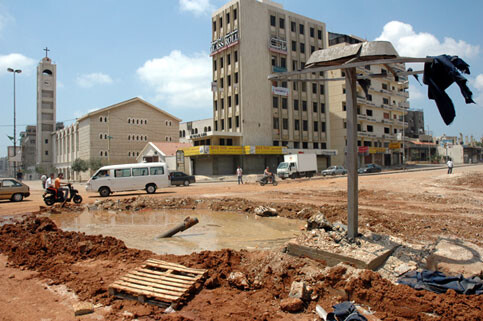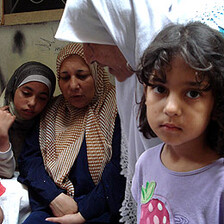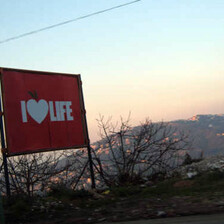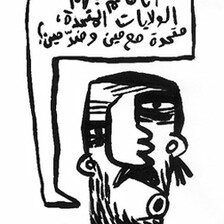Beirut 16 July 2006

The aftermath of attacks by Israel on Lebanon 16 July 2006. (Peter Speetjens/IRIN)
[Editor’s Note: Just after Mayssoun wrote this, she emailed that she and her family were heading for the shelter in their neighborhood. - EI]
I wake up with a heavy heart, and my heart weighs heavily all day long.
We go to bed with a celebration all over Lebanon for the shelling of the Israeli warship on Friday night. We wake up to more news of death, destruction, displacement, anger sadness and fear.
I look from the window and see that the vegetable store has closed. I am feeling restless, sad, and angry. A few minutes after we wake, the power goes off.
I go to clean the dishes … there is no water. I complain … there is still a fine line of water coming from the faucet. I start to clean the glasses, but the water trickles down to just a few drops. I am still trying to rinse off the glass. I complain … I then I just wait. There are drops from the faucet. I save them and I clean the glasses, waiting for water which coming drop by drop. I close the faucet, and wait a bit. Water gathers and a fine line is coming down.
I clean another glass, and then I wait … Tears start to roll down my cheeks and a question inside is surging up forcefully: “Why? It is so unfair!”
I go to start the computer, but there is no power anymore.
I am feeling angrier … I bite my lips and I wait … maybe the power will return soon?
I go down to buy vegetables. I roam the area, but all the vegetable shops are closed. No more vegetables coming to Beirut from anywhere…I am complaining.
I wait until the roads are opened again. I come back home with a few onions and some garlic. I run to the elevator and I wait. My neighbor shows up and starts laughing at me: “What are you waiting for? There is no electricity! Yallah! It’s good to exercise, so take the stairs!”
My brain is not functioning anymore. What am I waiting for? I actually do not know. But it seems the war is going to teach me to wait. We wait for the power to revisit us. For the water to flow from faucets again. For the computer battery to be recharged, so I can write this report.
We wait for the roads to re-open so that we are freed. For Israeli shelling to stop so we can sleep. For the Israelis to leave the country!!
But then I stop and think: to where do they withdraw? To Palestine! They will be back!
I have to learn to wait … For an international community to wake up from its deafening silence. For the list of the dead is getting long … Beirut under siege will impose its own timetable on us.
We can no longer extend the day with a light to read or to do things until very late in the night. The city under siege will tell us when we can do these things.
Life from now on will be lived differently. I am thinking about waiting to the sounds of heavy shelling; shelling that gets heavier by the hour. The news says Israelis are expecting Nasrallah to be hiding in mazes underground and that they are using powerful bombs to reach underground, to penetrate the earth, in other words. You can imagine how heavy the shelling is. With each bomb, my heart sinks and I am waiting, waiting for the power to come so I hear the news.
Here it is: there is power again! I need to fill buckets with water for use when the power goes off again. I run to the bathroom, and again run to the TV room to watch the news.
News about the massacre of the people in Marwaheen [near Tyre/Sour] has started to come out. The residents of the village were trying to escape the village after they were refused shelter in the UN headquarters office. The UN officer told them to go back home, for Israel is not going to shell the houses. He was kind enough to say that they will take their 90-year-old relative by car, while the others can walk back home.
The residents were scared, and rode a minibus to leave. On the road they were shelled. The news shows scenes of women, men, children laying in heaps in the shelled minibus, missing hands, body parts, all bloodied. A child lay without a hand, another with his stomach coming out. The Israeli shells had scythed through them as they were trying to leave for somewhere safer. More scenes:
Bodies held aloft.
Bodies left to burn while alive.
Blood running in streams, literally in streams, from the shelled vehicle.
My heart is getting heavier and I am getting more restless.
I wait for the Arab council that was meeting:
The decision was to file a complaint to the Security Council!
What an Irony! The UN refusing to host refugees from Marwaheen, and an Arab council a few minutes later suggesting they will file a complaint with the Security Council.
It felt like they are giving their ok to our shelling! It was stupid to wait for them anyway.
Shelling on the outskirts of Shatila, phone calls to know everyone is ok. Tears are falling on the other side of the phone, I am boiling inside, but need to appease, to give hope, and wait.
Flash news, shelling on Baalbeck kills more than twenty people.
Shelling of the ports … all the ports …
Shelling the roads, all the small roads that until now were still left untouched …
They are even shelling the Beirut lighthouse! I wonder why … and I can’t think of a reason but a psychological war to make us go against the Resistance. They think they will reach their main aim of the invasion, the destruction of the resistance, and the appointment of a puppet regime.
I am getting … madder … sadder … angrier … I want to blow something up. I feel a revolution inside of me.
We want to end of all this, we need this to end. We need an ending!
I am restless … I go from one window to the other. Wherever I look, I see people sitting by the windows or on the verandas looking, waiting, and I think of waiting again.
Waiting, one might assume, has a negative connotation, i.e., passivity. But this is not true under siege, where waiting embodies resistance. It is resistance despite all the forms of violence we are facing, resistance to all forms of war we are subjected to, not only from the Israelis but also from the deafening silence of the international community.
Waiting in times of war embodies fighting it all with the hope to stay united, to not give in to the Israeli rulers who are betting on our suffering under the new situation in the city, betting we complain and go against the resistance. In our waiting there is struggle; struggle to keep hope despite all the psychological wars against us; struggle to keep fighting despite all the destruction. Waiting in such a time is an act of change. Change is such a slow process, and in order to change we have to learn to wait.
This is a battle of wills, and whoever’s will breaks first will lose. Waiting under siege is steadfastness, and steadfastness is what is needed now.
Related Links
Mayssoun Sukarieh is writing from her hometown of Beirut





